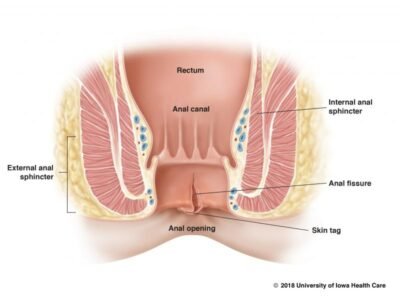Anal Fissure
The Anal fissure is a small cut or tears in the mucous lining of the anus, causing rectal pain before, during or after passing stool. It may also lead to fresh bleeding during and after the passage of stool. Anal fissure can be acute or chronic in nature and at times recurrent. It is more common in infant and young children since they have a tendency of habitual constipation, however it can happen at any age.
Why does it happen?
The commonest cause of an anal fissure is due to passing hard and large stool. There may be other reasons like –
- Straining during defecation
- Constipation
- Frequent diarrhoea
- Over lifting
- Childbirth
- Anal intercourse

Less common causes are-
- Anal cancer
- HIV
- Herpes infection
- Tuberculosis
- Syphilis
I am suffering from rectal pain, is it an Anal Fissure?
Anal Fissure may present with the following symptoms:
- Sharp cutting pain in the anal region with bleeding during defecation (passage of stool).
- The person feels a burning sensation after defecation and it can last up to several hours.
- A visible tear in the skin around the anus with a small lump on the skin at one end. This is called Sentinel Piles, and people sometimes confuse this as Piles.
Is there any risk from this?
The answer is both Yes and No! If the fissure is of acute origin without any significant symptoms, it may heal on its own with some basic lifestyle modification. But a Sub-acute, Chronic or recurrent one can prove to be serious.
- Straining and passing large and hard stool during defecation can increase the risk of anal fissure and complicate the condition.
- Habitual constipation is also a significant risk.
- During and after Childbirth women are more affected by an anal fissure
- Anal intercourse
- Weight over lifting may also precipitate anal fissure
What to do? Are there any ways to prevent it?
Yes! There are…
- Eat more fibrous food
- Drink adequate liquid
- Avoid straining during defecation
- Do regular exercise but not weight-lifting\
- Avoid food that causes constipation
- “Seitz bath” is quite helpful
- Domestic lubricant like Coconut oil may be helpful
Diagnosis
The doctor can diagnose an anal fissure by examining the area around the anus. The doctor may perform a detailed examination to confirm the diagnosis. During a rectal exam, the doctor may insert an Anoscope(It is a thin tube-like instrument) into the rectum to see the tear around the anus. Anoscope is used for the visualisation of the anal canal and lower part of the rectum. At times a biopsy is also taken in a suspicious case to evaluate the seriousness of the condition.
What Homeopathy can do in cases of an Anal Fissure?
As mentioned earlier an acute and trivial anal fissure may heal itself without taking medicine. But at times it can become complicated and extremely painful, thus disturbs the daily life. In such cases, Homeopathy can give a long term relief. With the continuation of the doctor’s advice and attention to your diet and bit of lifestyle modification, one can achieve a permanent solution. You should take more fibrous food and an adequate amount of fluid. Regular exercise may play a big role in the prevention of anal fissure. Homoeopathic medicines are made from natural substances and these medicines have no side effect. Some frequently prescribed ones are Nitric acid, Ratahnia, Aesculus, Phosphorus, Bryonia Alba, Alumina, Natrum Mur, Sulphur, Graphites, Caustic, Ignatia etc. But self-medication can be harmful and ineffective. Since the choice of right medicines and dosages varies from person to person and each individual’s constitution.
The experienced and well-qualified doctors of Let’s Homeopathy would be happy to help you by listening and evaluating them according to the seriousness of the condition and finally prescribe the Right Medicine for YOU! So why wait…. we are just a call away!